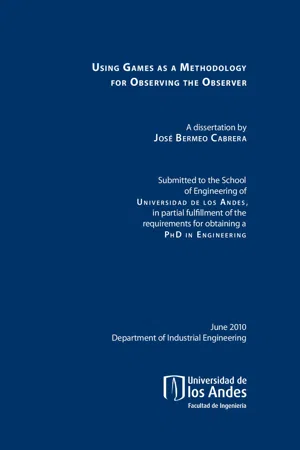
- Spanish
- PDF
- Disponible en iOS y Android
Using games as a methodology for observing the observer
Información del libro
Using Games as a Methodology for Observing the Observer constructs a methodology of active learning for observing the observer. The tool used is the construction of games. The basic questions are: What actions can be taken to allow the subject to observe him or herself? and How can learning activities be used to reconstruct the subject's experience during the observation? The basic reference framework for the qualitative research is constructivism. The conceptual and philosophical analysis of research is second-order cybernetics that gives relevance to the theory of the observer and to the relationship between the observer and what is observed. Games are the constitutive elements of a space of action wherein a world emerges. For the construction of the games the group is organised according to specific structures, which make up a work network within the proposed experimental scenario.Every reflexive discourse (conceptual, informational and descriptive) on the describer's properties system will be formed, at least, of the perspectives, dispositions and distinctions in the language of the observer. In this sense, to observe the observer does not constitute a representation of analysable, controllable and predictable process, but rather, to observe the observer will mean interpreting (or unveiling) the metaphors that constitute him or her in any proposed stage of experimentation. This dissertation contributes to the advancement of second-order cybernetics as a context for improving the effectiveness of learning. The usefulness of games as a methodology for observing the observer means that it is possible to propose a comparison between, on the one hand, the dynamics of the social system built by the methodology's application participants and, on the other, the networks that can be built in terms of the language used. This has been part of the research carried out in the Interdisciplinary Complex Systems Research Center - CeiBA.
Preguntas frecuentes
Información
Índice
- Acknowledgments
- Abstract
- List of Tables
- List of Figures
- Introduction
- Interpreting the Observer
- Research Strategy and Design
- Applied Concepts
- The Game as Articulator of Concepts, Epistemologies and Theories
- Reconstruction of the Observer
- Summary, Results, Research Contributions and Closing Reflections
- Bibliography
- Appendix